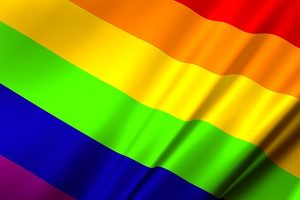
It doesn’t have to be a chess game with winners and losers, but that’s the game as it is played today. In the beginning there was the word, and the word was homosexual. “Leave us alone,” they said. “Let us live our lives, what happens in the bedroom is nobody’s business but ours,” and society slowly agreed to live and let live.
In 2003, the U.S. Supreme Court – in Lawrence v Texas – decriminalized same-sex conduct. And then state legal battles began to heat up. California, for example, passed Proposition 8 in 2008 defining marriage as only between a man and a woman, which was overturned by a higher court as unconstitutional.
So what’s the problem? Well, the Christian Bible, for example, calls homosexuality and sodomy sinful and “an abomination.” Not every believer interprets the Bible literally, of course, but the Biblical statements are unequivocal. And Islam is similar, with both adultery and homosexuality condemned.
One can debate the rightness or wrongness of such sentiments but the fact is that scriptures deemed as coming from God or Allah are rather straightforward in their import and from the highest authority. And according to the First Amendment: “Congress shall make no law respecting an establishment of religion, or prohibiting the free exercise thereof ….” But for believers, things were slipping further and further from the Biblical.
LGBTQ became the sobriquet for the variety of non-heterosexuals. Heterosexuals were termed “cisgender” or someone whose sexual identity is the same as the gender assigned at birth. “Cisgender” was chosen as the opposite of “transgender” in the race for who defines what, which is being won, evidently, by non-cisgenders who didn’t want to be on the receiving end of the heterosexual-homosexual dichotomy.
In recent years, cases have exploded over issues such as allowing LGBTQ people to enlist in the military or trans females to participate in female sports or use ladies’ restrooms and shower facilities. As the push for LGBTQ rights expanded into nearly every part of American life, it impinged more heavily on religious liberty, and a number of such legal cases have reached the U.S. Supreme Court.
One landmark Supreme Court case was the 2015 Obergefell decision which decreed that same-sex marriage was indeed marriage and was protected by the 14th Amendment.
Writing in that decision, Justice Kennedy spoke of battles as yet undecided when he wrote: “Finally, it must be emphasized that religions, and those who adhere to religious doctrines, may continue to advocate with utmost, sincere conviction that, by divine precepts, same-sex marriage should not be condoned. The First Amendment ensures that religious organizations and persons are given proper protection as they seek to teach the principles that are so fulfilling and so central to their lives and faiths, and to their own deep aspirations to continue the family structure they have long revered. The same is true of those who oppose same-sex marriage for other reasons. In turn, those who believe allowing same-sex marriage is proper or indeed essential, whether as a matter of religious conviction or secular belief, may engage those who disagree with their view in an open and searching debate.”
That said, the “open and searching debate” has been thus far mostly relegated to the dustbin and everything has ended up in court. In Masterpiece Cakeshop, for example, a Christian baker refused to make a wedding cake for a same-sex couple as against his religious principles. The baker won in court, but was sued three times at last count.
The mechanics of religion vs. LGBTQ rights have creaked along, case after case, working their way up the ladder to the Supreme Court which, because of recent appointments, has tipped to a more conservative body.
So Congress, with its Democratic president, majority in the House, and a Democratic vice president to cast the deciding vote in the Senate, is moving a bill forward called the “Equality Act,” which would amend the Civil Rights Act of 1964. The Act would specify protection for sexual orientation and gender identity, and expand coverage into all federally funded programs, public accommodations such as retail stores, online retailers and transportation providers. That means that Masterpiece Cakeshop would be forced to bake cakes for same-sex marriages religious convictions be damned.
In addition, the Equality Act would pull the plug on the Religious Freedom Restoration Act (RFRA) – which added protections for religious liberty and was signed by President Clinton in 1993 – in cases in which it conflicted with the Equality Act.
So it is past time for LGBTQ activists and people of faith to discuss a path forward. It is time for that “open and searching debate” mentioned by Justice Kennedy and some compromises worked out. There are plenty of bakers who will make same-sex wedding cakes so stop singling out people of faith to make them wrong. And there are plenty of religious groups – like the United Methodist Church — that is dividing over the issue of LGBTQ treatment – trying to reconcile the tenets of their faith with a love of humanity regardless of bodily plumbing and one’s attitude toward it. Attacking only harden defenses and weaken logic.
Charles Franklin is the pen name of a retired minister
